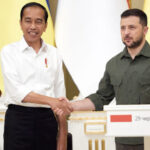
Japan and South Korea are only a ferry ride away from each other. Their economies are among the world’s largest. Their democracies and their cultural ties are as strong as ever. Yet their diplomatic ties have been cold for years over historical and legal disputes – that is, until this week. At a NATO meeting in Spain, the heads of each country hinted at putting the future over the past.
The two leaders, Japanese Prime Minister Fumio Kishida and South Korean President Yoon Suk-yeol, met briefly at a dinner and then joined U.S. President Joe Biden for a trilateral summit – the first such gathering in five years. The United States needs two of its closest allies in Asia to get along. With an eye toward rising threats from Russia, China, and North Korea, both Japan and South Korea now seem inclined.
For his part, Mr. Yoon suggested that democracies must work together to protect “universal values” that some countries deny. His Japanese counterpart said cooperation has never been more vital because of threats to the rule-based international order.
Once Japan holds a parliamentary election in July, the two leaders could possibly meet in a one-on-one summit. And in August, both countries will join the U.S. in holding naval exercises off Hawaii to improve their surveillance of North Korea.
“I am convinced that Prime Minister Kishida can become a partner who can solve issues between Korea and Japan,” said Mr. Yoon after their meeting.
Resolving the thicket of issues left over from Japan’s 1910-1945 colonial rule of the Korean Peninsula will not be easy. One compromise, however, may be in the works. Reports in South Korea indicate the two sides are discussing a face-saving way to compensate former Korean wartime laborers with private money. For its part, Japan expects South Korea to abide by a 1965 treaty that normalized bilateral relations and included compensatory grants and loans.
Helping Japan and South Korea to reconcile is one of Mr. Biden’s top 10 priorities for the Asia-Pacific region. The two Northeast Asian neighbors certainly know they have shared threats – from a bullying China and a North Korea on the verge of another nuclear test. To overcome their respective deep resentments, their leaders may now be looking for a common tool of reconciliation: shared values in need of safekeeping.
Read this story at csmonitor.com
Become a part of the Monitor community




